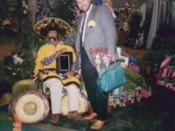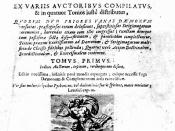Jan Phillips article The Craft of the Wise tells of how she came
to learn of one of her ancestors who was hung during the Salem Witch
Hunts. This lit an interest in her mind to further research the subject
of Wicca, the craft of the wise. By consulting many books about
witchcraft, she learned that Wicca is more of a nature and imagination
based religion than the spellcasting voodoo practicing stereotype it has
been made out to be in the past. Through her research, she finds out that Wicca and Paganism have become the fastest growing religions in the United States. She then goes on to tell the differences between magic and the supernatural. She closes by stating that we should try to see ourselves in other people instead of focusing in on our differences.
The second article I found concerning Wicca emphasizes Jan
Phillips that despite peoples personal preferences we are all human
beings. The article Do You Believe In Magic tells the plight of two
practicing witches, the Riley's, who chose to open a pagan shop in a predominantly Christian town. Due to differences in religious views, their land lord refused to renew their lease. Many townspeople, including several town ministers, publicly voiced their
objections to the couples business venture. The Riley's gathered fellow
Pagans from surrounding areas and marched down the towns main street
publicly displaying their beliefs. People began to compare this incident to the Salem Witch Hunts. Just as Jan Phillips ancestor was tortured because of she allegedly chose to practice her beliefs, so were the Riley's for choosing to go public with their beliefs.
The third article I read was about an average American woman who
is also a High Priestess of a Boston area coven. She tells of how
traditional Protestant beliefs were not for her, and how Wicca seemed to
fit her ideals better. Like the Riley's, she too has been the victim to
discriminations due to her religious choice. Ms. Ralph, the witch
mentioned above, describes an incident when a coworker was bothered so
much by her religion that she went to Ms. Ralph's superiors. The coworker claimed that Ms. Ralph was performing animal sacrifices and was
threatening to cast a spell on her family. Ms. Ralph couldn't understand how someone could be so opposed to another's personal beliefs. In the end of the article she goes on to say that her boss saw through the whole scheme, and listened to what her religion really entailed. To her surprise he was very open-minded to her religious practices, and she wondered why others couldn't be the same. Unlike the previous article, Ms Ralph was not made to give up her career. Her main point was that just because she was a woman and a practicing Wiccan that she wasn't evil or to be feared.
This final article has to do with an author who was researching
for her next book, and came across an interesting reference book. She came across a book titled Malleus Maleficarum. The book was an old reference guide for the church in the late 16th and 17th century. This very book may have been one of the pieces of evidence used to prosecute Jan Phillips ancestor. It used the words woman and witch synonymously. She then began to look into how women were perceived as the creators of evil. Everything listed in this book blamed women for the evil in the world. It also gave guidelines for the criteria needed to burn someone at the stake and publicly hang convicted witches. The article basically showed how people perceived witchcraft in the past compared to now, and that even now, people still refuse to believe that evil is not created it just is. This article basically combines the problems of the previous three articles. The fear and unacceptance of the religion called Wicca is an age old one. It can be seen in almost any part of our nation. Though we no longer burn people at the stake or hang witches in the town square, people today still try to segregate Pagan followers and persecute them for their religious choice.


